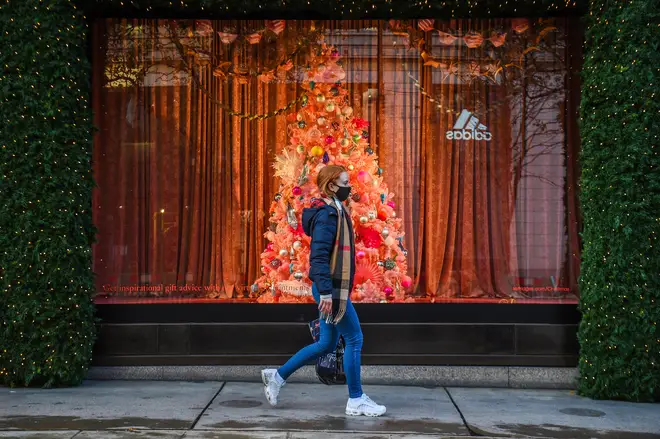
Richard Spurr 1am - 4am
20 November 2020, 05:53

Coronavirus rates are levelling out and may be starting to drop, a leading scientist has suggested.
But Professor Neil Ferguson, of Imperial College London, warned social restrictions may need to remain in large parts of England when the national lockdown ends next month to stop infection levels rebounding immediately and undoing any benefits.
The epidemiologist, whose modelling led to the original lockdown in March, told the Guardian infection rates appear to be "plateauing" and may be starting to go down slowly.
Read more: Northern Ireland to extend lockdown weeks before Christmas
Read more: WHO suggests swapping Xmas dinner for Covid-friendly 'picnic in the park'
He added: "A halving of infection prevalence over the four weeks would be a positive result."
Prof Ferguson said it was "too early" to tell how much of an impact the second national lockdown will have by December 2 but claimed the previous tier system had made a difference.

Defence Secretary tells LBC he hopes we can all look forward to a better Christmas
He said: "We now have clear evidence that Tier 3 measures were working to bring down infection rates in some areas. Tier 2 was also having an impact, but a smaller one.
"The decision is a political one, but if we don't want to see infection levels rebound from December 3 my assessment is that measures between Tier 2 and Tier 3 will be necessary in the great majority of locations."
The Government reported a further 501 people had died within 28 days of testing positive for Covid-19 as of Thursday, bringing the UK death total to 53,775, while there have also been a further 22,915 lab-confirmed cases of coronavirus in the UK.
It was the second day in a row that the number of deaths had dropped, having fallen from 598 on Tuesday to 529 on Wednesday.
However, the majority of local authority areas in England (197 out of 315) have seen a rise in cases, adding to concerns restrictions may have to continue into the festive period.
University College London's (UCL) Professor Andrew Hayward claimed allowing a "return to normality" over Christmas posed "substantial risks", particularly for older people.

Science and medical chiefs quizzed on Christmas Covid restrictions
The professor of infectious disease epidemiology, and member of the Scientific Advisory Group for Emergencies (Sage), said the country was "on the cusp" of being able to vaccinate older populations and it would be "tragic" to throw away the gains made in suppressing coronavirus.
Downing Street has suggested families should be able to meet up after a "difficult year" and Defence Secretary Ben Wallace said on Thursday a final decision will be made as close to the end of England's national lockdown as possible.
Reports suggest households might be allowed to mix indoors for a five-day period from Christmas Eve, and that ministers are considering plans to allow three or four households to form bubbles.
However, a five-day easing could mean a potential 25-day period of tighter measures into January if the Government was to follow advice from scientists.
It comes as two vaccines are expected to be rolled out before the new year and Oxford University published phase 2 results from its clinical trial into a coronavirus vaccine, showing it produces a strong immune response in older age groups.
Professor Andrew Pollard, head of Oxford's vaccine trial team, said he was "absolutely delighted" with the results and the jab was "well tolerated" in older people.

Public health expert: Government is "a bit like a one-trick pony" on Covid
The Health Service Journal (HSJ) also reported that NHS England has told local leaders that each of the 42 health and care systems in England should have at least one mass vaccination site, while larger systems could have two.
These are likely to be in conference centres or similar large venues, with Derby City Council confirming talks were under way to use Derby Arena as a temporary facility to help administer the vaccine.
Early results have also suggested the drug tocilizumab, used to treat rheumatoid arthritis, can improve clinical outcomes of critically ill patients with Covid-19.
The medicine, which suppresses the immune system and reduces inflammation, has been shown to be effective in treating patients in intensive care units (ICU) with severe Covid-19 although the findings are yet to be published in a peer-reviewed journal.
Meanwhile Northern Ireland will shut non-essential retail, pubs and restaurants for two weeks from November 27, while MSPs voted to support new Covid-19 restrictions in Scotland, including tougher measures in 11 council areas and a travel ban for the worst-hit areas.
Areas of west and central Scotland will move from Level 3 to Level 4 on Friday for three weeks, which will see non-essential shops and hospitality businesses close along with gyms and beauty salons.
A Downing Street press conference is also expected to take place on Friday.